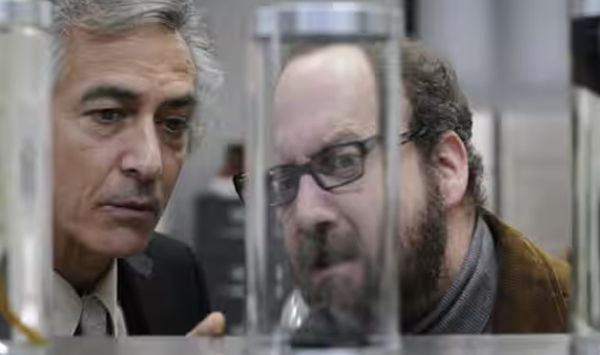Eye For Film >> Movies >> Cold Souls (2008) Film Review

Cold Souls is a surreal comedy, with a similar sensibility to the films of Charlie Kaufman. However, Sophie Barthes soul-searching metadrama has a lot more to say about society’s quick-fix mindset than the more transient explorations in Eternal Sunshine Of The Spotless Mind and Synecdoche, New York. This is post-Kaufman frivolity; a timely retort to consumerism and an important critique of commodity culture.
Debut director Barthes does well to take the reins of a complex premise, but it is her ailing anti-hero who really steals the show. Playing himself in painfully self-loathing circumstances, Paul Giamatti is the embodiment of the uneasy everyman, with a shuffling, sullen demeanour, bedraggled beard and starch-collared overcoat. This is a fictional performance, of course, but one playing up to the quirks and anxieties that have come to characterise Giamatti’s independent film roles.

Agonising over his participation in a Broadway rendition of Chekhov’s Uncle Vanya, Giamatti’s mood echoes the melancholy of the eponymous character he is fretting over. Desperate for resolution, he chances upon a New Yorker article about a company offering an ideal, if unlikely, remedy: Soul Storage. Disillusioned, Giamatti sceptically signs up and, reassured by an ever sonorous David Strathairn, undergoes the process of soul extraction. Catharsis, however, is not on the cards. Left empty (95 per cent at least), he becomes increasingly frustrated, realising that without a soul he is little more than a ghost in a world powered by the very thing he has just given up.
Stranded in psychological purgatory, Giamatti’s personal relationships begin to unravel as he pines over his surrendered soul. As desperate as he was for change he now wants out, but just as he comes to terms with his flaws, Giamatti discovers how shady the Soul Storage Company are. Uncovering the transatlantic soul trafficking trade that is fuelling the whims of foreign clientele, Giamatti is informed that his soul has been misplaced and in the mother of clerical errors, has been acquired by a Russian actress (and a not very good one at that). In this twist, Barthes points to the flippancy of fast-food consumer culture, but just when your mind begins to probe the idea, she refrains from digging deeper. Although this is a constructive piece of directing narratively speaking, it is a shame that she gives permission for audiences’ minds to wander, only to snatch you back to your seat just as quickly.
Still, this is comedy, albeit dark, and Barthes has great fun toying with her audiences’ perceptions of reality. With tongue firmly in cheek Cold Souls thrives off the irony and contradictions that plague its protagonist. In his humourless husk, Giamatti is actually very funny, and although void of emotion he is an entirely engaging character. As amusing as it is absurd, his journey will leave you thankful this is fiction, although somehow, and perhaps worryingly, it doesn’t really feel all that far fetched.
This is anti-celebrity cinema and while this is a deprecation of fame, rather than an antidote to it, it is nonetheless intelligent and sharply observed. In its conclusion, Cold Souls clears its mind, resets its sights and reflects poignantly on self-respect and discovery. It might well be an unlikely fate but, ultimately, such morality, however eccentrically inclined, brings about a sense of humanity that is both impossible to ignore and a joy to watch.
Reviewed on: 27 Oct 2009


















